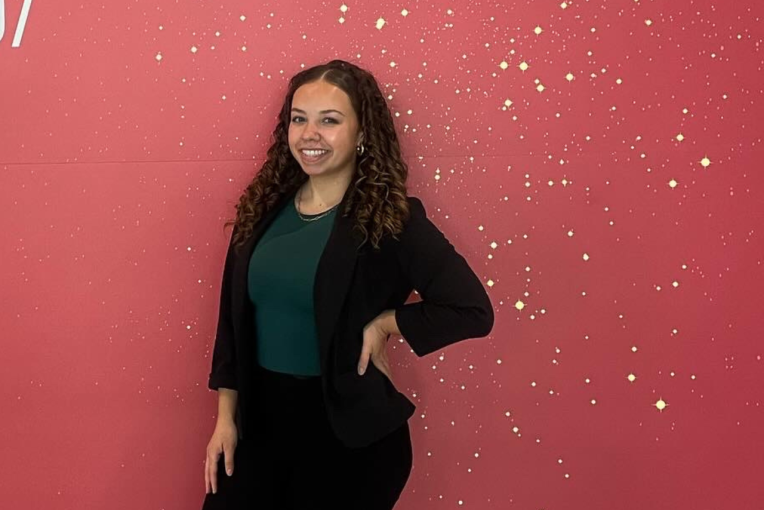The Graduate School has selected Caroline Guiffre as its December 2023 GradBird Scholar recipient. GradBird Scholar is an initiative to recognize graduate students for their scholarly endeavors at Illinois State University.
Caroline is currently in her second year of graduate school in the Communication Sciences and Disorders department in the speech-language pathology program. Her research focuses on the social communication difficulties of children adopted out of foster care. She has always enjoyed working with kids and spending time around them, and loves her current job at a day care. In her free time, she likes to work out, spend time outside, journal, or spend time with friends.
What is your favorite part of your program?
My favorite part of my program is the connections I get to make with others. When you are part of a major that works to understand and develop communication, you begin to make really cool connections with the people around you. My relationships with my professors, my clinical educators, my classmates, and my clients have been amazing.
Do you work with a specific faculty/staff member to help with your research? What has your experience been like working with them?
Dr. Ciera Lorio is my mentor for my thesis. My experience working with her has been wonderful. She is the kind of teacher who makes you realize you can do all the things that feel impossible. She really does a great job breaking things up into manageable steps, and she provides a ton of support along the way. I have learned so much through working with her.
Can you explain your research and the importance of it within your field?
My research methodology was guided by the question: Do children adopted out of foster care exhibit social communication difficulties, and if so, what types of difficulties do they experience?
Children who have spent time in foster care are often subject to traumatic events during their early years. Research shows that exposure to early trauma is associated with various language difficulties. However, there is a lack of literature related to how time in foster care may impact social language skills. I developed a survey for adoptive parents to report on their children’s social skills, that was reviewed by multiple professionals as well as a foster parent. I distributed the survey via Facebook to parents who have adopted a child out of foster care between ages 5-17. I compiled data from the survey to illustrate general areas of challenge and strength that adoptive parents reported. I also conducted four followup phone interviews with participants to bring in qualitative data and see how it compared with my quantitative survey data. I put this research together into a presentation and was a presenting author at the 2023 American Speech-Language and Hearing Association Convention in Boston on November 17, 2023. I am currently analyzing data from the same survey, this time given to biological parents of children from a more traditional family structure, that I will compare with my adopted foster child population. My final findings will be presented at the Graduate School Research Symposium in April 2024.
Time in foster care is associated with negative peer interactions and behavior problems. Behavior problems have the potential to negatively affect social development and cause difficulty in forming relationships with others. Frequent interactions and relationships with others are associated with a higher quality of life. As speech-language pathologists (SLPs), our scope of practice includes social skills. This is a population that is likely being underserved in this area. Because of the complexity of the backgrounds of children with trauma, many of them have co-occurring disabilities in language or learning. Typically, academic concerns will take priority in the schools, and the schools are where these children are getting support services. However, if they are not given support for social language development, these children may be missing out on forming strong, meaningful relationships. The goal of my research is to help inform speech-language pathologists on potential risk areas in social communication for this population, and clarify where or how we can support these children. The ability to connect and engage with others is a lifelong skill that many of us take for granted. We need to not only make sure that these children can succeed academically, but also provide them with the tools to form worthwhile, powerful connections throughout their lives.
Why do you enjoy researching this topic and what more do you hope to learn about it?
I enjoy researching this topic because social skills are still such an untapped area. The rules of society can sometimes be confusing or arbitrary, yet your ability to follow them affects the way people view you. While individuals do not necessarily need to follow these rules, it’s important that they are aware of society’s expectations. Being seen as an outsider can have difficult impacts on someone’s quality of life. I also think trauma-informed care is extremely important, and that there are many populations that need our support with a trauma-informed approach.
What do you hope further research about this topic will do to benefit the greater of society?
I hope it will encourage us to soften our view on children who present with difficult behaviors or struggle to fit in with peers. I hope that we will be able to acknowledge and honor individual differences, while also giving those who need a little extra help with social communication the right tools to navigate the world.
Would you like to highlight anything else about your research or promote anything specific you are involved in?
Many of us take for granted the ability to communicate. Many of us still struggle to communicate effectively with those around us. Communication is power, and doing it well is a skill that often needs to be facilitated along the way.

